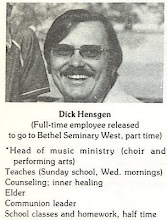





 Ken's lead article discusses the upcoming hearings. From this time on until 1980, our problems with the city were always somewhat a part of our life; sometimes only a background hum, but other times a real concern. The year 1975 was probably the high point for all of this. As the year went on, things seem to get worse and worse in our relationship with the city. Of course as the problems got worse and worse, the controversy grew. We became quite familiar with seeing ourselves on the evening news.
Ken's lead article discusses the upcoming hearings. From this time on until 1980, our problems with the city were always somewhat a part of our life; sometimes only a background hum, but other times a real concern. The year 1975 was probably the high point for all of this. As the year went on, things seem to get worse and worse in our relationship with the city. Of course as the problems got worse and worse, the controversy grew. We became quite familiar with seeing ourselves on the evening news. Ken mentions the fact that many of us went around getting signatures for a petition to the city. I don't doubt his word (I can't remember all of the details), but our experience with the neighbors was certainly not positive. I have written about the specifics in another post.
The little article by Joyce Clark was very interesting to me. The church was very much into C. S. Lewis. Our children performed plays based upon the Chronicles of Narnia. "Mere Christianity" was very much a part of bringing me back into fellowship with the Lord; many others were influenced by it also. Since science fiction was one of my favorite forms of literature, I loved his Space Trilogy.
In a much earlier posting on this blog I discussed the Pioneer/Settler Theology. This was an important background piece in our understanding of being the people of God. The actual writing appeared several times in the lifetime of the publication. It was talked about and dramas were performed about it. Non of us wanted to be a settler. We were of spiritual pioneer stock!
I have mentioned Mike Sandez before. I am still always interested in his take on life. He was a deep young man and has become a deep mature man. He is presently a Law Professor at Liberty College.
Lastly, I will just call attention to Larry's article on a new game. This is actually quite funny. I personally find it all the funnier because this is very different than most of the things that Larry wrote.



















































.jpg)